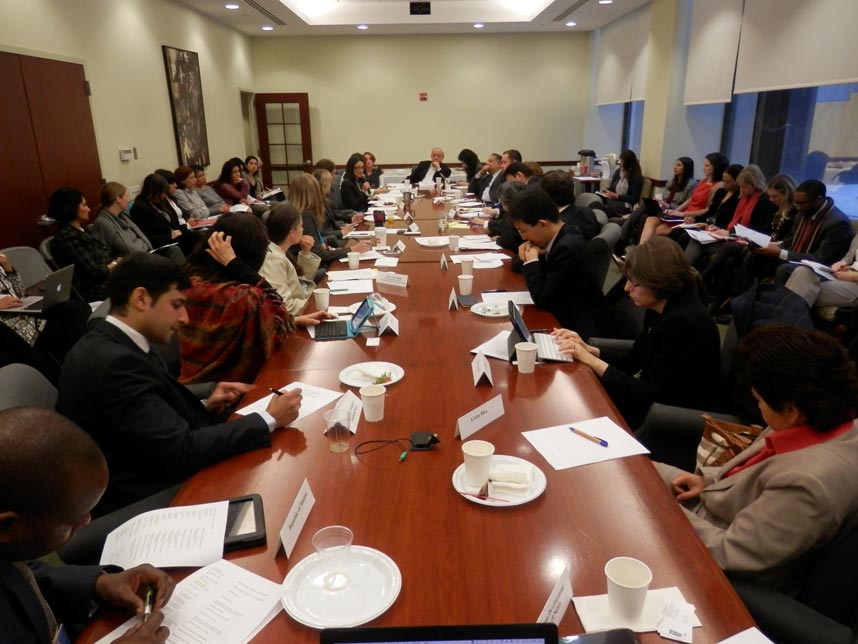The views expressed in our content reflect individual perspectives and do not represent the authoritative views of the Baha'i Faith.
The tendency of aggression is an innate, independent, instinctual disposition in man… – Sigmund Freud
Mankind must evolve for all human conflict a method which rejects revenge, aggression, and retaliation. – The Reverend Dr. Martin Luther King, Jr.
Do not think the peace of the world an ideal impossible to attain! – Abdu’l-Baha, Paris Talks, p. 29.
As far back as the beginnings of human civilization we’ve debated this question: are people inherently aggressive and violent? Will humans always fight?
Up until fairly recently, many social scientists said yes. Six thousand years of violent human behavior, including war, seemed like sufficient evidence for that conclusion.
But during the past fifty years or so, the preponderance of the scientific evidence has begun to shift. In 1986, when mainstream social and biological scientists from around the world gathered to mark the United Nations’ International Year of Peace, they issued The Seville Statement on Violence. Signed and endorsed by scientists from multiple countries and global regions, including anthropologists, ethnologists, physiologists, political scientists, psychiatrists, psychologists and sociologists, their statement made a bold and sweeping assertion:
Some people say that violence and war cannot be ended because they are part of our natural biology. We say that is not true. People used to say that slavery and domination by race and sex were part of our biology. Some people even claimed they could prove these things scientifically. We now know they were wrong. – The Seville Statement on Violence.
A massive review of the available scientific research, the statement concluded that nothing in human biology is an insurmountable obstacle to the abolition of war. Human beings invented war, the Seville Statement says, and can invent a global peace that will replace it. Now adopted and codified into policy by the entire United Nations system, The Seville Statement concludes with five propositions:
It is scientifically incorrect to say that we have inherited a tendency to make war from our animal ancestors.
It is scientifically incorrect to say that war or any other violent behavior is genetically programmed into our human nature.
It is scientifically incorrect to say that in the course of human evolution there has been a selection for aggressive behavior more than for other kinds of behavior.
It is scientifically incorrect to say that humans have a ‘violent brain’.
It is scientifically incorrect to say that war is caused by ‘instinct’ or any single motivation.
In a fascinating synchronicity, the Universal House of Justice, the global governing body of the worldwide Baha’i community, reached the same conclusion one year earlier:
…so much have aggression and conflict come to characterize our social, economic and religious systems, that many have succumbed to the view that such behaviour is intrinsic to human nature and therefore ineradicable.
With the entrenchment of this view, a paralyzing contradiction has developed in human affairs. On the one hand, people of all nations proclaim not only their readiness but their longing for peace and harmony, for an end to the harrowing apprehensions tormenting their daily lives. On the other, uncritical assent is given to the proposition that human beings are incorrigibly selfish and aggressive and thus incapable of erecting a social system at once progressive and peaceful, dynamic and harmonious, a system giving free play to individual creativity and initiative but based on co-operation and reciprocity.
As the need for peace becomes more urgent, this fundamental contradiction, which hinders its realization, demands a reassessment of the assumptions upon which the commonly held view of mankind’s historical predicament is based. Dispassionately examined, the evidence reveals that such conduct, far from expressing man’s true self, represents a distortion of the human spirit. – The Promise of World Peace, The Universal House of Justice, 1985.
These two global organizations, representing the agreement of science and religion that the Baha’i Faith so actively encourages, came to the same exact determination—that human beings do not have fundamentally aggressive or violent natures, and that war is not our birthright or our inevitable destiny as a species. This gives us reason for hope:
The grassroots effort of the Baha’is should prepare the ground for the transition from the present system of national sovereignty to a system of world government. This it can do by… engaging people from all walks of life in discussions on peace, and on instilling and encouraging a sense of personal commitment to the prerequisites of peace. In a word, what is needed now is a world-wide consciousness of not only the requirements but also the possibility, and inevitability, of peace. Therefore, our immediate and inescapable task as Baha’is is to imbue the populations with such hope. – The Universal House of Justice, 1987.
This crucial part of the Baha’i message—that peace will inevitably break out when humanity unites—can help us all counter the old, outmoded idea that our nature will always lead us into violent conflict. The Baha’i teachings clearly say that making a personal commitment to the prerequisites of peace will bring war that much closer to its extinction.


















Comments
Sign in or create an account
Continue with Facebookor